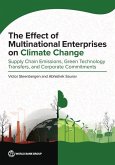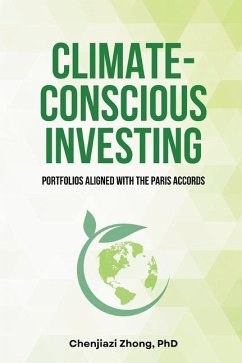- Broschiertes Buch
- Merkliste
- Auf die Merkliste
- Bewerten Bewerten
- Teilen
- Produkt teilen
- Produkterinnerung
- Produkterinnerung
The volume brings together leading climate change policy experts to set out the economic analysis and the nature of the negotiations at the United Nations Climate Change Conference in Copenhagen and beyond.
Andere Kunden interessierten sich auch für
![Global Solutions: Demanding Total Accountability For Climate Change Global Solutions: Demanding Total Accountability For Climate Change]() Tom S. MullikinGlobal Solutions: Demanding Total Accountability For Climate Change10,99 €
Tom S. MullikinGlobal Solutions: Demanding Total Accountability For Climate Change10,99 €![Economic Thought and U.S. Climate Change Policy Economic Thought and U.S. Climate Change Policy]() Economic Thought and U.S. Climate Change Policy12,99 €
Economic Thought and U.S. Climate Change Policy12,99 €![Climate Change Impacts on Tropical Forests in Central America Climate Change Impacts on Tropical Forests in Central America]() Climate Change Impacts on Tropical Forests in Central America70,99 €
Climate Change Impacts on Tropical Forests in Central America70,99 €![The Effect of Multinational Enterprises on Climate Change The Effect of Multinational Enterprises on Climate Change]() Victor SteenbergenThe Effect of Multinational Enterprises on Climate Change41,99 €
Victor SteenbergenThe Effect of Multinational Enterprises on Climate Change41,99 €![Climate Policy Foundations Climate Policy Foundations]() William C. WhitesellClimate Policy Foundations29,99 €
William C. WhitesellClimate Policy Foundations29,99 €![Climate-Conscious Investing Climate-Conscious Investing]() Chenjiazi ZhongClimate-Conscious Investing34,99 €
Chenjiazi ZhongClimate-Conscious Investing34,99 €![The WSPC Reference on Natural Resources and Environmental Policy in the Era of Global Change (In 4 Volumes) The WSPC Reference on Natural Resources and Environmental Policy in the Era of Global Change (In 4 Volumes)]() The WSPC Reference on Natural Resources and Environmental Policy in the Era of Global Change (In 4 Volumes)1.414,99 €
The WSPC Reference on Natural Resources and Environmental Policy in the Era of Global Change (In 4 Volumes)1.414,99 €-
-
-
The volume brings together leading climate change policy experts to set out the economic analysis and the nature of the negotiations at the United Nations Climate Change Conference in Copenhagen and beyond.
Hinweis: Dieser Artikel kann nur an eine deutsche Lieferadresse ausgeliefert werden.
Hinweis: Dieser Artikel kann nur an eine deutsche Lieferadresse ausgeliefert werden.
Produktdetails
- Produktdetails
- Verlag: OUP UK
- Seitenzahl: 566
- Erscheinungstermin: 8. Juli 2013
- Englisch
- Abmessung: 234mm x 156mm x 30mm
- Gewicht: 848g
- ISBN-13: 9780199606276
- ISBN-10: 0199606277
- Artikelnr.: 33723146
- Herstellerkennzeichnung
- Books on Demand GmbH
- In de Tarpen 42
- 22848 Norderstedt
- info@bod.de
- 040 53433511
- Verlag: OUP UK
- Seitenzahl: 566
- Erscheinungstermin: 8. Juli 2013
- Englisch
- Abmessung: 234mm x 156mm x 30mm
- Gewicht: 848g
- ISBN-13: 9780199606276
- ISBN-10: 0199606277
- Artikelnr.: 33723146
- Herstellerkennzeichnung
- Books on Demand GmbH
- In de Tarpen 42
- 22848 Norderstedt
- info@bod.de
- 040 53433511
Dieter Helm holds a number of advisory board appointments, including Chairman of the Academic Panel of the Department of Environment, Food and Rural Affairs and member of the Advisory Panel on Energy and Climate Security, Department for Energy and Climate Change. He was a member of the DTI Sustainable Energy Policy Advisory Board 2002-7 and of the Prime Minister's Council of Science and Technology 2004-7. He is an associate editor of the Oxford Review of Economic Policy. Dieter Helm's career to date has spanned academia, public policy, and business. He founded Oxera in 1982 and has published extensively on environmental, energy, infrastructure, and regulation topics. Cameron Hepburn has advised several governments and international institutions on climate and environmental policy, and he currently serves on UK Defra's Academic Panel. He is an Associate Editor of the Oxford Review of Economic Policy, a Research Fellow at New College, Oxford, and he has over a decade's experience working on environmental issues and climate change, with a particular focus on emissions trading and carbon markets. He holds a DPhil (PhD) in economics from Oxford, and undergraduate degrees in law and engineering from the University of Melbourne.
* 1: Dieter Helm and Cameron Hepburn: Introduction
* Part One: Revisiting the Economics of Climate Change
* 2: Dieter Helm: Climate-change policy: why has so little been
achieved?
* 3: Cameron Hepburn and Nicholas Stern: The global deal on climate
change
* 4: Scott Barrett: Climate treaties and the imperative of enforcement
* 5: Ross Garnaut, Stephen Howes, Frank Jotzo and Peter Sheehan: The
implications of rapid development for emissions and climate-change
mitigation
* 6: Kjell Arne Brekke and Olof Johansson-Stenman: The behavioural
economics of climate change
* Part Two: The Global Players and Agreements
* 7: Paul Collier, Gordon Conway and Anthony Venables: Climate change
and Africa
* 8: Jiahua Pan, Jonathan Phillips and Ying Chen: China's balance of
emissions embodied in trade: approaches to measurement and allocating
international responsibility
* 9: Vijay Joshi and Urjit R. Patel: India and climate-change
mitigation
* 10: Robert N. Stavins: Addressing climate change with a comprehensive
US cap-and-trade system
* 11: Dieter Helm: EU climate-change policy: a critique
* Part Three: Low-carbon Technologies
* 12: Dieter Helm: Nuclear power, climate change, and energy policy
* 13: Howard Herzog: Carbon dioxide capture and storage
* 14: Richard Green: Climate-change mitigation from renewable energy:
its contribution and cost
* 15: Krister P. Andersson, Andrew J. Plantinga, and Kenneth R.
Richards: The national inventory approach for international
forest-carbon sequestration management
* 16: David G. Victor: On the regulation of geo-engineering
* 17: Steven Sorrell: Improving energy efficiency: hidden costs and
unintended consequences
* Part Four: National and International Instruments
* 18: Cameron Hepburn: Carbon taxes, emissions trading and hybrid
schemes
* 19: Gernot Wagner, Nathaniel Keohane, Annie Petsonk, and James S.
Wang: Docking into a global carbon market: Clean Investment Budgets
to finance low-carbon economic development
* 20: Cameron Hepburn: International carbon finance and the Clean
Development Mechanism
* Part Five: Institutional Architecture
* 21: Joanna Depledge and Farhana Yamin: The global climate-change
regime: a defence
* 22: Arunabha Ghosh and Ngaire Woods: Governing climate change:
lessons from other governance regimes
* Bibliography
* Part One: Revisiting the Economics of Climate Change
* 2: Dieter Helm: Climate-change policy: why has so little been
achieved?
* 3: Cameron Hepburn and Nicholas Stern: The global deal on climate
change
* 4: Scott Barrett: Climate treaties and the imperative of enforcement
* 5: Ross Garnaut, Stephen Howes, Frank Jotzo and Peter Sheehan: The
implications of rapid development for emissions and climate-change
mitigation
* 6: Kjell Arne Brekke and Olof Johansson-Stenman: The behavioural
economics of climate change
* Part Two: The Global Players and Agreements
* 7: Paul Collier, Gordon Conway and Anthony Venables: Climate change
and Africa
* 8: Jiahua Pan, Jonathan Phillips and Ying Chen: China's balance of
emissions embodied in trade: approaches to measurement and allocating
international responsibility
* 9: Vijay Joshi and Urjit R. Patel: India and climate-change
mitigation
* 10: Robert N. Stavins: Addressing climate change with a comprehensive
US cap-and-trade system
* 11: Dieter Helm: EU climate-change policy: a critique
* Part Three: Low-carbon Technologies
* 12: Dieter Helm: Nuclear power, climate change, and energy policy
* 13: Howard Herzog: Carbon dioxide capture and storage
* 14: Richard Green: Climate-change mitigation from renewable energy:
its contribution and cost
* 15: Krister P. Andersson, Andrew J. Plantinga, and Kenneth R.
Richards: The national inventory approach for international
forest-carbon sequestration management
* 16: David G. Victor: On the regulation of geo-engineering
* 17: Steven Sorrell: Improving energy efficiency: hidden costs and
unintended consequences
* Part Four: National and International Instruments
* 18: Cameron Hepburn: Carbon taxes, emissions trading and hybrid
schemes
* 19: Gernot Wagner, Nathaniel Keohane, Annie Petsonk, and James S.
Wang: Docking into a global carbon market: Clean Investment Budgets
to finance low-carbon economic development
* 20: Cameron Hepburn: International carbon finance and the Clean
Development Mechanism
* Part Five: Institutional Architecture
* 21: Joanna Depledge and Farhana Yamin: The global climate-change
regime: a defence
* 22: Arunabha Ghosh and Ngaire Woods: Governing climate change:
lessons from other governance regimes
* Bibliography
* 1: Dieter Helm and Cameron Hepburn: Introduction
* Part One: Revisiting the Economics of Climate Change
* 2: Dieter Helm: Climate-change policy: why has so little been
achieved?
* 3: Cameron Hepburn and Nicholas Stern: The global deal on climate
change
* 4: Scott Barrett: Climate treaties and the imperative of enforcement
* 5: Ross Garnaut, Stephen Howes, Frank Jotzo and Peter Sheehan: The
implications of rapid development for emissions and climate-change
mitigation
* 6: Kjell Arne Brekke and Olof Johansson-Stenman: The behavioural
economics of climate change
* Part Two: The Global Players and Agreements
* 7: Paul Collier, Gordon Conway and Anthony Venables: Climate change
and Africa
* 8: Jiahua Pan, Jonathan Phillips and Ying Chen: China's balance of
emissions embodied in trade: approaches to measurement and allocating
international responsibility
* 9: Vijay Joshi and Urjit R. Patel: India and climate-change
mitigation
* 10: Robert N. Stavins: Addressing climate change with a comprehensive
US cap-and-trade system
* 11: Dieter Helm: EU climate-change policy: a critique
* Part Three: Low-carbon Technologies
* 12: Dieter Helm: Nuclear power, climate change, and energy policy
* 13: Howard Herzog: Carbon dioxide capture and storage
* 14: Richard Green: Climate-change mitigation from renewable energy:
its contribution and cost
* 15: Krister P. Andersson, Andrew J. Plantinga, and Kenneth R.
Richards: The national inventory approach for international
forest-carbon sequestration management
* 16: David G. Victor: On the regulation of geo-engineering
* 17: Steven Sorrell: Improving energy efficiency: hidden costs and
unintended consequences
* Part Four: National and International Instruments
* 18: Cameron Hepburn: Carbon taxes, emissions trading and hybrid
schemes
* 19: Gernot Wagner, Nathaniel Keohane, Annie Petsonk, and James S.
Wang: Docking into a global carbon market: Clean Investment Budgets
to finance low-carbon economic development
* 20: Cameron Hepburn: International carbon finance and the Clean
Development Mechanism
* Part Five: Institutional Architecture
* 21: Joanna Depledge and Farhana Yamin: The global climate-change
regime: a defence
* 22: Arunabha Ghosh and Ngaire Woods: Governing climate change:
lessons from other governance regimes
* Bibliography
* Part One: Revisiting the Economics of Climate Change
* 2: Dieter Helm: Climate-change policy: why has so little been
achieved?
* 3: Cameron Hepburn and Nicholas Stern: The global deal on climate
change
* 4: Scott Barrett: Climate treaties and the imperative of enforcement
* 5: Ross Garnaut, Stephen Howes, Frank Jotzo and Peter Sheehan: The
implications of rapid development for emissions and climate-change
mitigation
* 6: Kjell Arne Brekke and Olof Johansson-Stenman: The behavioural
economics of climate change
* Part Two: The Global Players and Agreements
* 7: Paul Collier, Gordon Conway and Anthony Venables: Climate change
and Africa
* 8: Jiahua Pan, Jonathan Phillips and Ying Chen: China's balance of
emissions embodied in trade: approaches to measurement and allocating
international responsibility
* 9: Vijay Joshi and Urjit R. Patel: India and climate-change
mitigation
* 10: Robert N. Stavins: Addressing climate change with a comprehensive
US cap-and-trade system
* 11: Dieter Helm: EU climate-change policy: a critique
* Part Three: Low-carbon Technologies
* 12: Dieter Helm: Nuclear power, climate change, and energy policy
* 13: Howard Herzog: Carbon dioxide capture and storage
* 14: Richard Green: Climate-change mitigation from renewable energy:
its contribution and cost
* 15: Krister P. Andersson, Andrew J. Plantinga, and Kenneth R.
Richards: The national inventory approach for international
forest-carbon sequestration management
* 16: David G. Victor: On the regulation of geo-engineering
* 17: Steven Sorrell: Improving energy efficiency: hidden costs and
unintended consequences
* Part Four: National and International Instruments
* 18: Cameron Hepburn: Carbon taxes, emissions trading and hybrid
schemes
* 19: Gernot Wagner, Nathaniel Keohane, Annie Petsonk, and James S.
Wang: Docking into a global carbon market: Clean Investment Budgets
to finance low-carbon economic development
* 20: Cameron Hepburn: International carbon finance and the Clean
Development Mechanism
* Part Five: Institutional Architecture
* 21: Joanna Depledge and Farhana Yamin: The global climate-change
regime: a defence
* 22: Arunabha Ghosh and Ngaire Woods: Governing climate change:
lessons from other governance regimes
* Bibliography








